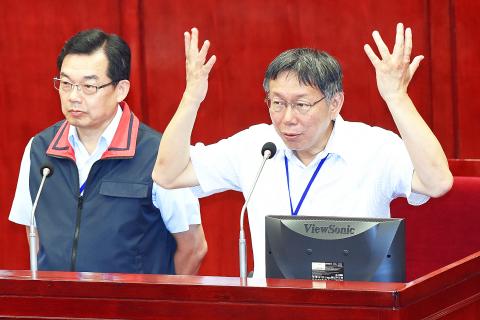Taipei Mayor Ko Wen-je (柯文哲) yesterday said he would still run for re-election next year if the Democratic Progressive Party (DPP) nominates its own candidate.
Ko made the remark in response to a hypothetical question by Chinese Nationalist Party (KMT) Taipei City Councilor Chin Huei-chu (秦慧珠) on the second day of question-and-answer sessions at the Taipei City Council.
Chin asked whether Ko would run for president in 2020 if the DPP were to nominate its own candidate for next year’s mayoral election and cost him re-election.

Photo: Liao Chen-huei, Taipei Times
“I would return to being a doctor,” Ko said. “What I will do after returning to medicine can be considered later, but I think I should not answer too many hypothetical questions and should just focus on city policies, because too many people overthink too much.”
He said that he would run for re-election next year, regardless of the DPP’s support, but added: “I need their help and I am trying to gain their support, but if they do not want to help, I cannot do anything about it either.”
Ko said he has no idea what his relationship with the DPP is right now, but added that it is probably “somewhat good.”
A majority of city councilors asked him about Taipei Police Department Commissioner Chiu Feng-kuang (邱豐光), who the National Police Administration on Monday announced would be transferred to another post.
Ko had said he would not transfer Chiu as punishment for a protest during the Taipei Summer Universiade opening ceremony last month, but yesterday told city councilors that Minister of the Interior Yeh Jiunn-rong (葉俊榮) informed him about the decision only about 30 minutes before it was announced.
Yeh told the mayor that there were too many protests in Taipei that were not properly handled, Ko said, but added that he told Yeh that the issue could be discussed and that as the Universiade was successful, making Chiu leave his post now would be like the Chinese idiom “after the cunning hare is killed, the hound is boiled,” or discarding of those who do the work after it is done.
Many KMT city councilors said the central government did not respect Ko, asking him if he would contest the appointment of Taichung Police Department Commissioner Chen Jia-chang (陳嘉昌) to Taipei.
Ko said that the Ministry of the Interior cited functional considerations for the appointment, not as punishment for Chiu, adding that he thinks that politics should not interfere with the police and military, as he does not want to make it hard for them to do their job, because they are civil servants.

MORE VISITORS: The Tourism Administration said that it is seeing positive prospects in its efforts to expand the tourism market in North America and Europe Taiwan has been ranked as the cheapest place in the world to travel to this year, based on a list recommended by NerdWallet. The San Francisco-based personal finance company said that Taiwan topped the list of 16 nations it chose for budget travelers because US tourists do not need visas and travelers can easily have a good meal for less than US$10. A bus ride in Taipei costs just under US$0.50, while subway rides start at US$0.60, the firm said, adding that public transportation in Taiwan is easy to navigate. The firm also called Taiwan a “food lover’s paradise,” citing inexpensive breakfast stalls

TRADE: A mandatory declaration of origin for manufactured goods bound for the US is to take effect on May 7 to block China from exploiting Taiwan’s trade channels All products manufactured in Taiwan and exported to the US must include a signed declaration of origin starting on May 7, the Bureau of Foreign Trade announced yesterday. US President Donald Trump on April 2 imposed a 32 percent tariff on imports from Taiwan, but one week later announced a 90-day pause on its implementation. However, a universal 10 percent tariff was immediately applied to most imports from around the world. On April 12, the Trump administration further exempted computers, smartphones and semiconductors from the new tariffs. In response, President William Lai’s (賴清德) administration has introduced a series of countermeasures to support affected

CROSS-STRAIT: The vast majority of Taiwanese support maintaining the ‘status quo,’ while concern is rising about Beijing’s influence operations More than eight out of 10 Taiwanese reject Beijing’s “one country, two systems” framework for cross-strait relations, according to a survey released by the Mainland Affairs Council (MAC) on Thursday. The MAC’s latest quarterly survey found that 84.4 percent of respondents opposed Beijing’s “one country, two systems” formula for handling cross-strait relations — a figure consistent with past polling. Over the past three years, opposition to the framework has remained high, ranging from a low of 83.6 percent in April 2023 to a peak of 89.6 percent in April last year. In the most recent poll, 82.5 percent also rejected China’s

PLUGGING HOLES: The amendments would bring the legislation in line with systems found in other countries such as Japan and the US, Legislator Chen Kuan-ting said Democratic Progressive Party (DPP) Legislator Chen Kuan-ting (陳冠廷) has proposed amending national security legislation amid a spate of espionage cases. Potential gaps in security vetting procedures for personnel with access to sensitive information prompted him to propose the amendments, which would introduce changes to Article 14 of the Classified National Security Information Protection Act (國家機密保護法), Chen said yesterday. The proposal, which aims to enhance interagency vetting procedures and reduce the risk of classified information leaks, would establish a comprehensive security clearance system in Taiwan, he said. The amendment would require character and loyalty checks for civil servants and intelligence personnel prior to